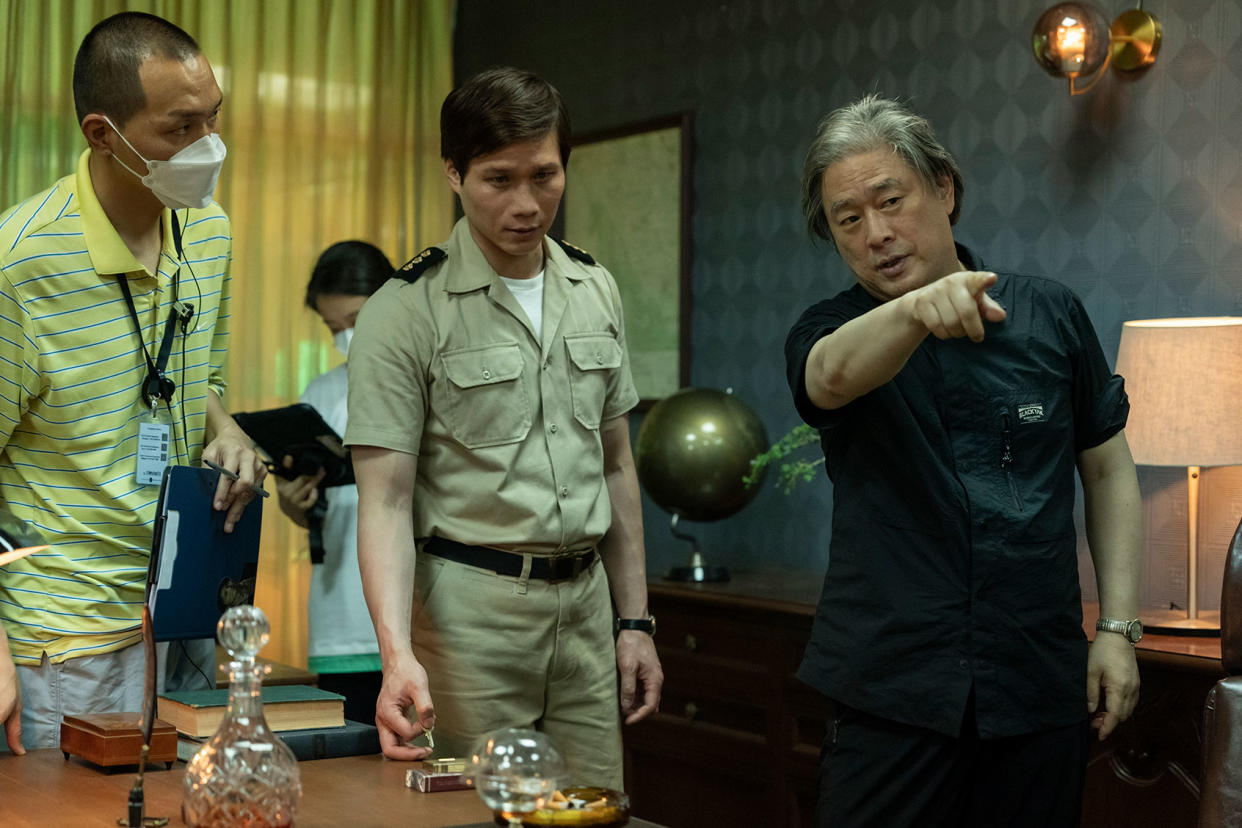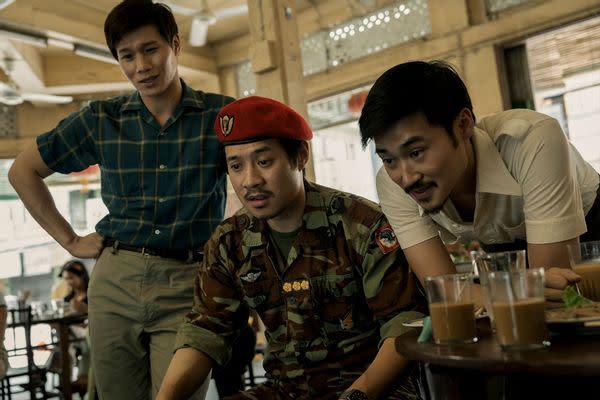"Sometimes I would push away our audience": "The Sympathizer" director Park Chan-wook feels for us

- Oops!Something went wrong.Please try again later.
- Oops!Something went wrong.Please try again later.
- Oops!Something went wrong.Please try again later.
- Oops!Something went wrong.Please try again later.
South Korean filmmaker Park Chan-wook wants us to picture fireworks while watching “The Sympathizer.” That image inspires his visual interpretation of Viet Thanh Nguyen’s Pulitzer Prize-winning 2015 novel and as he explains to me through an interpreter, it recurs time and again onscreen.
The premiere holds the first volley during the fall of Saigon as flares streak the sky and bombs pummel the airstrip where the Captain (Hoa Xuande) is desperately fleeing with his best friend Bon (Fred Nguyen Khan). Now they’ve settled into American life and Los Angeles, there will be an Independence Day celebration. Eventually the Captain takes a job as a cultural consultant on a movie using pyrotechnics.
As Park explains, these aren’t simply literal interpretations but metaphorical. Nguyen’s prose is the wick that ignited the charges he set on our screens.
“I tried very hard to make his colorful writing into a visual form,” Park explained in a recent Zoom interview. Thus, fireworks.
Both as a screenwriter and director, Park’s vision is precise, strategic and guided by a solid philosophy. In his seven-part limited series, which he developed with co-showrunner Don McKellar, he isn’t content to simply parrot what’s on the page or traipse through the Captain’s journey from Saigon to Los Angeles with his South Vietnamese general boss (Toan Le) and his C.I.A. handler (Robert Downey Jr., one of several roles he plays).
He speaks of casting the audience in the role of the Captain’s interrogator, the Commandant, at the re-education camp from where Captain is imprisoned and narrating the story. “The Sympathizer” enters the Captain’s story nearly a year into his imprisonment, and many drafts into writing what's deemed as his confession, which reads like a manuscript and retraces his faulty memory.

“The Commandant, at the beginning, is someone who is very critical and who questions the Captain, but mesmerized by the Captain’s very articulate and very dramatic life that he’s gone through,” Park remarked. “And there's an element that is very similar to ‘Arabian Nights’ in that sense. Our seventh episode is when our Captain's confession has ended, and by that point, the viewer has a sense that there's sort of a bond between the Commandant and the Captain.”
“And I should not say more because it might become a spoiler,” he added. “But there's a fracture, there's a sudden shift in our Commandant’s attitude towards the captain.
Park’s best-known films are literary adaptations, including 2016’s “The Handmaiden” and 2003’s “Oldboy,” his introduction to the broader U.S. film audience, which began as a manga tale. In a curious stroke of creative influences circling back on each other, Nguyen mentioned to The New Yorker that “Oldboy” was a primary influence on “The Sympathizer.” Park told me he had no prior knowledge of that before he met Nguyen; neither did he engage the author about it.
“But the thing is, in terms of ‘Oldboy,’ I intentionally went about expressing [and] infusing this very flamboyant style in that work,” Park said. “I made a guess that perhaps he borrowed that idea into translating his very colorful prose into 'The Sympathizer.' But that was only my conjecture.”
Park is careful to clarify that his and McKellar’s interpretation of Nguyen’s work isn’t a direct or shot-for-shot recreation. Tapping into his license as both a visual artist and writer, he takes certain liberties with the story that invite new interpretations and meanings.
Using Downey Jr. to play at least four separate, unrelated people, and placing all of them in the same scene in at least one upcoming episode, originated with Park. That jibes with what he’s implying in “The Sympathizer” about the danger of ideologically driven authority figures of regardless one’s politics.
Downey Jr. represents the generic nature of Western privilege, with each of his characters assuming the Captain, a half-white, half-Vietnamese double agent, owes him a debt of gratitude and loyalty. But the Captain’s North Vietnamese contact and other childhood best friend Man (Duy Nguyễn), is no more invested in his well-being than the Downey Jr. face who pops up most frequently in the Captain’s life, his CIA handler Claude.

The layers of thought and practicality that Park assigns to “The Sympathizer” led me to wonder whether parts of Nguyen’s story provided a means of commenting on the audience’s tendency to revere certain filmmakers and excuse their excesses.
This emerges in the fourth episode with the introduction of Downey Jr’s Auteur, an aggressively self-involved filmmaker. But I also pointed out that aspects of the interactions between the Captain and his interrogator or Man are similar to that of a critic and the work he’s considering.
At times each of them reviews the Captain's actions for plausibility and rates the legitimacy of his loyalty to his country and his Vietnamese identity. I wondered, is this approach an outgrowth of Park's time as a film reviewer?
“Maybe you can say that. I didn't go about it consciously . . . But truth be told, yes, there's some part of me that is very interested in that idea, and perhaps it has to do with my background as a critic too,” he said. “But what is important for me whenever I go about making any kind of work is preserving the right amount of distance with the subject matter.”
Park’s objective, he said, is to have the viewer be engaged in the story and alight with the protagonist and his emotional state. “And sometimes I would push away our audience as if it's too cruel at some points,” he admitted. “So, it is important, perhaps, that the viewer is very conscious that this story is fabricated, and this situation that the characters are going through needs to be observed very objectively and intellectually.”
“Perhaps those are the moments where having this background as a critic comes helpful,” he offered.
Want a daily wrap-up of all the news and commentary Salon has to offer? Subscribe to our morning newsletter, Crash Course.
Nevertheless, launching lofty philosophical premises into the clouds is not Park’s aim with this series. “The Sympathizer” may whirl through time and continents, but as with the director's other work, it is a solidly organized work of art.
“What I want our audience to take away is all various political ideologies, or systems or revolutions, or ideals, originated with the purpose of bringing individual happiness,” he said. “But what ended up happening was it went the other way, and those attempts have actually suppressed the individuals. That has happened throughout history.”
If his script and direction leave the audience pondering anything about the series, he urged, “Think about that.”
New episodes of "The Sympathizer" air 9 p.m. Sundays on HBO and stream on Max.

